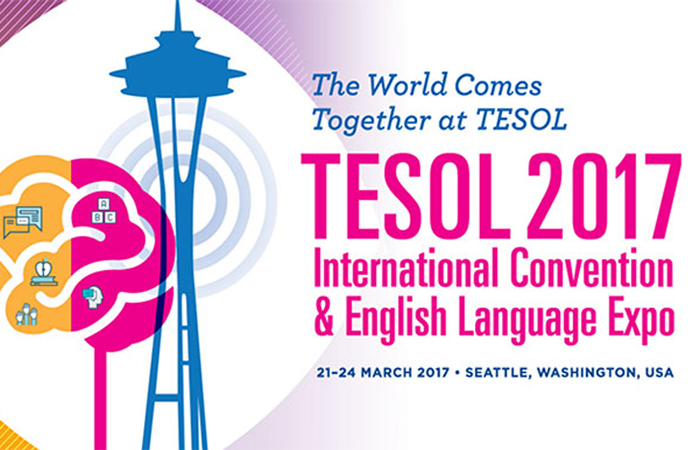
Congratulations to Sarah Grosik, Elizabeth Gillstrom, Michael Sullivan, Ian Nichols, Alyssa Swanson, Jeri Ahern, and Sheila Mayne who were accepted to present at the TESOL Conference 2017 in Seattle, Washington, as well as John Catlett who was accepted to the alternate list.
Sarah Grosik
PAIS/IEPIS Panel - Sustaining IEP Enrollment: Innovative Ways to Keep Your Program Afloat
In recent years, overall enrollment at Intensive English Programs across the country has been decreasing due to various factors including changes in scholarship benefits, visa restrictions, and increasing educational costs. This panel will discuss innovative approaches to sustaining IEP enrollment during times of extreme enrollment decline.
Sarah Grosik, Elizabeth Gillstrom, and Michael Sullivan
MOOCs: How Do We Know If Learners are Learning?
Massive open online courses (MOOCs) allow us to take language instruction to global audiences; however, these online courses also bring with them unique pedagogical challenges. The presenters outline their research on a series of language learning MOOCs, while discussing lessons learned about the most successful types of activities and assessments.
Ian Nichols
Herding Cats: Norming ITA Raters' Judgments
Insuring an acceptable degree of inter-rater reliability for International Teaching Assistant performance testing is crucial yet tricky. Three testing coordinators will share their institution's protocols as a start to a discussion on appropriate calibration samples, coaching and reliability. Participants will share their own practices while also learning from each other.
Toni McLaughlin
Strategies for Successful International Language Assistantships: Learning from the Field
This interactive session seeks to address research gaps by consolidating both challenges and best practices of international language assistantships. We present new data elicited from government-sponsored programs to provide resources for three key stakeholders--language assistants, administrators, and site coordinators--in order to optimize the assistantship experience for all involved.
Alyssa Swanson
PAIS Academic Panel: Maintaining Morale in Difficult Times
Programs today are facing challenges on many different fronts including, decreasing enrollments, budgetary threats, and potential partnerships with corporate entities. Programs must not only respond to these problems, but must also manage the internal issues and changes that arise as a result, including a decrease in employee morale. Panel organizers will review the results of a survey of program leaders that focuses in challenges their programs face, how employee morale is being affected, and any measures being taken to raise the spirits of their employees.
Jeri Ahern and Sheila Mayne
Emotional Labor in an IEP: The Power of Engagement
What is emotional labor for an IEP teacher? What kinds of emotional strategies do teachers employ to placate, motivate or encourage their students? These presenters' research addresses those questions, showing how authentic relationships benefit teaching. The participants will gain insight into developing self-awareness that leads to greater job satisfaction.
Sarah Grosik, Elizabeth Gillstrom and Michael Sullivan
Engaging the Pre-Intermediate MOOC Learner (Alt. List)
Content-Based Instruction is tricky at lower levels of proficiency, but teaching new learners can get even more challenging when the classroom is virtual. The presenters outline their curriculum development process for five online, content-based courses, and discuss takeaways and design strategies that participants can implement within their respective curricula.
John Catlett
Prosocial Benefits of Partial Mainstreaming for High-Performing Pathway Students (Alt. List)
A continuing problem among pathway programs is finding ways to socially integrate students post-completion. To address this, I selected and enrolled academically high-performing students in domestic classes while within a pathway. The purpose was measuring social costs of engaging with the larger student body before the completion of English language studies.
